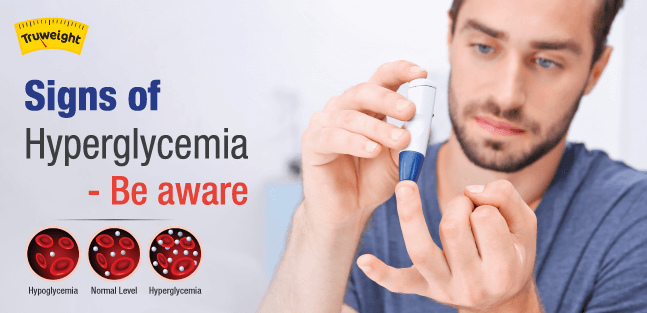Hyperglycemia is commonly known as high blood sugar. It is a condition in which sugar in excess circulates in the blood. If the sugar level in your body is higher than 200 mg/dl, then you have this condition.
Table of Contents:
- What is Hyperglycemia?
- Causes of Hyperglycemia
- Signs and Symptoms of Hyperglycemia
- A Life-Threatening Condition
- Tests for diagnosing Hyperglycemia
- Complications due to Hyperglycemia
What is Hyperglycemia?
Hyperglycemia is commonly known as high blood sugar. It is a condition in which sugar in excess circulates in the blood. If the sugar level in your body is higher than 200 mg/dl, then you have this condition.
In case the sugar levels in your blood range between 180-216 mg/dl, then it can result in organ damage over a span of time.
The disease due to illnesses other than diabetes can be treated by treating the main cause responsible for the rising glucose levels.
Causes of Hyperglycemia
It can take place due to many reasons, but type 2 diabetes is the main cause. Diabetes takes place in case the insulin level in the body is beyond normal level or the body’s inability to use the insulin.
While type 1 diabetes is responsible for only 5 percent of the case, type 2 diabetes is mainly responsible for this condition. There are some medical conditions apart from diabetes type 2 that can cause Hyperglycemia like –
- Pancreatitis
- Hyperthyroidism
- Pancreatic cancer
- Cushing’s Syndrome
- Growth hormone-secreting tumors
- Heart attack, stroke, or trauma of any kind that can cause temporary Hyperglycemia
- Certain types of medications such as prednisone, estrogens, oral contraceptives, glucagon that can raise the sugar levels in the blood
Signs and Symptoms of Hyperglycemia
The rate of hyperglycemia varies over time as it depends on the metabolic cause. Temporary Hyperglycemia usually does not show any symptoms.
Sugar levels in the blood can rise above normal and may cause some pathological changes in the body for some period of time without producing any symptoms.
In this period abnormality in carbohydrate metabolism can occur and can be tested by checking plasma glucose.
In case one is having chronic hyperglycemia which is above normal levels, it can be a reason for a number of complications such as kidney damage, neurological disorders, retina damage, and cardiovascular damage.
Susceptibility to infections can also occur due to chronic hyperglycemia. This condition needs immediate medical help as it can be a reason for serious complications. People with uncontrollable insulin-dependent diabetes are prone to this condition.
The symptoms listed below can be the reason for acute or chronic hyperglycemia.
1. Polyphagia
It is commonly known as excessive hunger or increased appetite. If a person is facing polyphagia he/she will intake abnormal amounts of solids.
A sudden increase in appetite can be a symptom of hyperglycemia.
2. Polydipsia
Layman terms, polydipsia means excessive thirst. While some researchers say that it is non-specific and can be a symptom of several medical disorders, it is still more commonly found in diabetic patients. If the patient is not able to control diabetes or irregular with their medications, then this symptom is actively found in them.
3. Polyuria
Means an excess amount of production of urine. This does not mean frequent urination. However, frequent urination generally accompanies this symptom. This increased volume of urination is also known as diuresis. Polyuria mostly takes place along with polydipsia.
When the glucose level in blood is extremely high, it is excreted through urine. Water follows the increase in glucose levels passively. This leads to an unusual outflow of urine from the body.
4. Blurred Vision
While the symptoms mentioned above are the most important signs of hyperglycemia, blurred vision is also another symptom of high sugar in the blood.
Increased sugar levels can cause temporary swelling of the lens, which results in blurred vision. If the high sugar level is controlled, this problem will no longer exist. If the sugar level is not controlled and blurred vision keeps reoccurring, it can even lead to cataracts. If the complication due to diabetes persists, it can even lead to bleeding in the retina, which can cause blindness.
5. Tiredness or Fatigue
 Can take place because of many other reasons, it has been found that people with diabetes often face tiredness. Researchers say that it can take place because of uncontrolled levels of sugar.
Can take place because of many other reasons, it has been found that people with diabetes often face tiredness. Researchers say that it can take place because of uncontrolled levels of sugar.
A Life-Threatening Condition
Facing the above symptoms, they should immediately see a doctor before the condition gets severe. High sugar levels in the blood is a medical emergency and can occur in both- Type 1 and Type 2 diabetes patients.
The prolonged condition starts damaging tissues and then organs. It also affects the immune system which is the reason why minor cuts or wounds take a long time to heal. Not only this, it can damage the nervous system, blood vessels, and kidneys. If the condition is not treated on time, it can even be a cause of death.
Tests for diagnosing Hyperglycemia
One notices the symptoms mentioned above, they should get some tests done by their doctor.
- Glucose levels in Blood- Getting a normal test of sugar will tell you your blood sugar level then. If the value indicated is between 70 mg/dl to 125 mg/dl, then you are in the safe zone.
- Fasting test- This test takes place in the early morning before eating or drinking anything. If the levels are above 126 mg/dl, it suggests diabetes.
- Glycohemoglobin test– This test is useful for indicating sugar levels over the past 3 months.
Complications due to Hyperglycemia
Prolonged hyperglycemia can cause severe damages to the body. It takes place in patients with diabetes and gets worse if the condition is not under control. The long-term problems due to this disease take place slowly over a period. Some of these are-
- Complications with the heart and blood vessels. Risk of heart attack, stroke, and artery diseases increases.
- Problems with the kidney. It can even lead to kidney failure.
- Burning sensation, pain, or tingling that can cause nerve damage
- Eye diseases can also take place due to Hyperglycemia. Damage to the retina, glaucoma, cataracts are some common complications of this medical condition.
Take Immediate Action!
Immediate Action: If you or someone close to you is experiencing any of the symptoms mentioned above, do not hesitate to contact your doctor or physician at the earliest. When it comes to hyperglycemia, the sooner you seek treatment for it, the better for you in the long run.
Talk to our expert Possible Nutritionist for more information and guidance. The first consultation is on us. Click here to avail.
